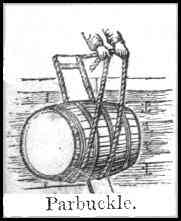My apologies for being late with the archaism this week. I was on vacation in Florida, so in honor of that I will make the crocodile the subject of this week’s definition.
 Latin name: Crocodilus
Latin name: Crocodilus
Other names: Cocatris, Cocodrille, Cocodrillus, Coquatrix, Corchodrillus
A beast that weeps after eating a man
The crocodile is a four-footed beast, about twenty cubits long, that is born in the Nile River. Its skin is very hard, so that it is not hurt when struck by stones. It spends the day on land and the night in the water. It is armed with cruel teeth and claws; it is the only animal that can move the upper part of its jaw while keeping the lower part still. Its dung can be used to enhance a person’s beauty: the excrement (or the contents of the intestines) is smeared on the face and left there until sweat washes it off. Crocodiles always weep after eating a man. Despite the hardness of the crocodile’s skin, there are two animals that can kill it. The sawfish (serra) can cut the crocodile’s stomach, and the hydrus can crawl into the crocodile’s mouth and kill it from the inside.
– Medieval Bestiary at bestiary.ca, edited by David Badke

 to that place where it is received below. This method is also frequently used used by masons, in lifting up or letting down large stones, when they are employed in building; and from them it has probably been adopted by seamen.
to that place where it is received below. This method is also frequently used used by masons, in lifting up or letting down large stones, when they are employed in building; and from them it has probably been adopted by seamen.